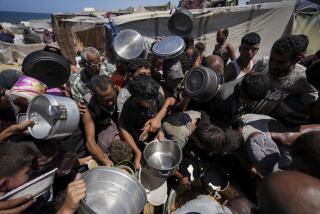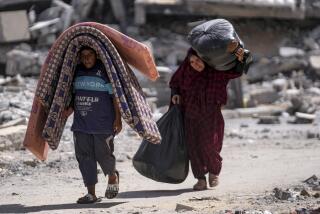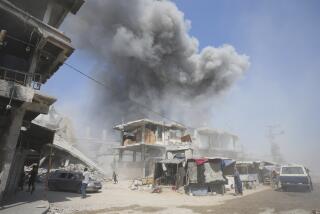Bosnian Travelers Safe; Were Refused U.N. Help : Balkans: British peacekeepers first denied shelter to attacked civilians, claiming they lacked a mandate.
- Share via
SARAJEVO, Bosnia-Herzegovina — Nearly 100 Bosnian travelers whose convoy was shelled by Croatian forces reached safety Saturday after spending a cold night outside a U.N. base where their appeals for shelter were ignored by British troops.
The soldiers later relented and escorted the besieged civilians to the relatively calm central city of Zenica. But the overnight standoff in which at least one elderly man collapsed from exposure and exhaustion illustrated the shortcomings of a U.N. mandate that ties the hands of peacekeepers whom the people turn to for protection.
The travelers, who were returning from jobs in Austria and Germany to their homes in the multiethnic city of Tuzla, were trying to negotiate their way through the volatile central Bosnian corridor flanked by Serb-held territory when their four-bus convoy was shelled.
Two of the civilians were killed and 16 wounded in the attack near Novi Travnik, in a region under the control of an aggressive band from the Bosnian Croat army, the HVO.
Those who survived the shelling traveled the few miles ahead to Vitez in hopes of gaining protection from the British regiment based there.
But after beseeching the troops for overnight shelter late Friday, the men, women and children spent the cold, damp night camped along a muddy roadside that has been the scene of fierce Croat-Muslim fighting for the past two months.
British officers reportedly told the group that the U.N. mandate did not extend to allowing them sanctuary.
Bosnian radio reports said several of the frightened travelers fell ill, including one elderly man who lost consciousness.
A U.N. military source in this Bosnian capital reported later Saturday that British armored vehicles had escorted the convoy to Zenica, where the exhausted travelers were to get help from a humanitarian aid organization before continuing their journey to Tuzla.
The incident showed the persistent dangers faced by civilians throughout Bosnia, now largely divided between aggressive Serbian and Croatian armies. And it seemed to validate the Bosnian government’s doubts about the safety of much of this war-ravaged republic in the event the territorial status quo is maintained, as is likely in the wake of a U.N. plan to create “safe havens” for victims of the past 14 months of war.
A Security Council resolution passed Friday designated six protected areas: Sarajevo, Tuzla, Bihac, Gorazde, Zepa and Srebrenica. But the number of troops and the latitude they will have for intervening in local clashes remain subjects for debate.
Bosnia’s Muslim-led government has condemned the havens proposal as an attempt by the West to wash its hands of the Bosnian crisis by pushing Muslims into squalid reservations.
And it fears that U.N. protection, which involves disarming any residents of the safe zones, will in the end leave the towns vulnerable to Serbian conquest.
But rebel Serbs who have already conquered and “ethnically cleansed” 70% of Bosnia reacted to the U.N. action with undisguised glee.
“I think it is a positive step that this resolution has finally been passed,” said the chairman of the Bosnian Serbs’ self-styled parliament, Momcilo Krajisnik, noting that the rebels were particularly pleased that the U.N. forces would effectively replace the elected Bosnian government in the administration of the enclaves.
One of the designated havens, Gorazde, continued to suffer a fierce Serbian attack Saturday, with Bosnian Serb radio claiming it had “liberated” two villages on the eastern outskirts of the city where at least 60,000 Muslims have withstood a yearlong siege.
The U.N. spokesman here, Canadian Cmdr. Barry Frewer, said U.N. military observers are still being barred from entering Gorazde by Serbian forces controlling all roads leading to the city.
“They have not been able to get passage from officials in Pale,” Frewer said, referring to the Bosnian Serb headquarters 10 miles east of here.
Central Sarajevo was also the scene of a major machine-gun battle throughout the afternoon, and government-controlled Sarajevo radio reported heavy fighting in the towns of Maglaj, Tuzla, Olovo, Gradacac and Bihac.
In the Yugoslav capital, Belgrade, meanwhile, authorities levied charges against the main opposition leader, Vuk Draskovic of the Serbian Renewal Movement.
Draskovic and his wife, Danica, are reported by their lawyer to have been seriously beaten while in police custody after being arrested at an anti-government demonstration.
They are being held on charges of trying to overthrow the state and could face up to 25 years in prison if convicted in courts that have routinely acted on behalf of the nationalist leadership.
More to Read
Sign up for Essential California
The most important California stories and recommendations in your inbox every morning.
You may occasionally receive promotional content from the Los Angeles Times.














